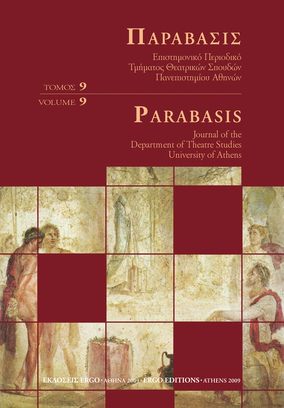Φιλοσοφικές αναφορές στα θεατρικά έργα του Machiavelli
Part of : Παράβασις : επιστημονικό περιοδικό Τμήματος Θεατρικών Σπουδών Πανεπιστημίου Αθηνών ; Vol.7, No.1, 2006, pages 385-392
Issue:
Pages:
385-392
Parallel Title:
Machiavelli’s philosophy as presented in his theatrical plays
Section Title:
Μελέτες και άρθρα
Author:
Abstract:
Renaissance saw comedy flourishing, especially in the Italian peninsula. Besides other literary works, Machiavelli became renowned for his comedies Mandragola and Clizia. These were written between the years 1518-1525, during Machiavelli’s exclusion from the active political service of Florence, probably as a way of curing his melancholy on the one hand and channelling his views to a larger audience, on the other. In both plays the author’s belief in the circular movement of history is noticeable - an element of great importance for his political theory - though here expressed in a rather pessimistic tone, as he insists that his epoch is worst than the antiquity. For Machiavelli history is not a closed deterministic system: fortune often intervenes and hinders people from prospering and achieving their goals. The author maintains that fortune should be treated as a woman in the meaning that one has to subjugate her. Moreover, he takes the opportunity to reiterate his basic ethical premise: good is that what is best for the majority. He seems, however, to ignore that, in practice, this principle abrogate the swiftness of decision that necessarily characterizes a political agent. Finally, Machiavelli discusses the political situation in Florence offering valuable inferences on how to instigate political change.
Subject (LC):
Keywords:
δραματουργία




